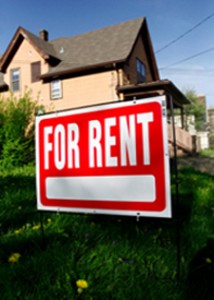Posted by Teresa on December 18, 2009 under General | 
 Call them goals, call them promises–call them whatever you want! But jot these ideas down and refer to them often. Here are a few ways landlords and property managers can make 2010 a more successful year.
Call them goals, call them promises–call them whatever you want! But jot these ideas down and refer to them often. Here are a few ways landlords and property managers can make 2010 a more successful year.
1. Don’t hesitate to start eviction proceedings when necessary. We’ve covered those situations before. It’s unpleasant and can be expensive, but in nearly every case, the behavior that necessitates eviction is not going to change.
2. Keep up with your local market to know whether you’re undercharging or overcharging rent. Do the former, and you’re losing money. With the latter, you’ll lose tenants.
3. Properly prescreen tenants—every tenant, every time. Nothing will do more to keep your business secure—and lead to more peace of mind for you. Don’t fall into the “desperate for a tenant” trap. Keep your standards high and you’ll have high-quality tenants.
4. Enforce the rules strictly. Don’t be afraid to let tenants know what you expect, and the consequences for breaking your rules. You’ll have fewer problems and headaches if you are clearly in charge in the landlord/tenant relationship.
5. Treat your income property business like a business. Keep excellent records, regular business hours, and a separate telephone line with voice mail. Avoid getting too personal with your tenants/clients.
6. Establish goals, make a plan and hold yourself accountable for reaching them. Whether it’s a higher cash flow, keeping expenses in line, or purchasing an additional income property, knowing what you’d like to achieve in your business is the first step in getting there.
7. Watch your cash closely. If necessary, establish an emergency fund that you do not touch. Be prepared for major repairs—you never know when you’ll need to replace a roof or fix a flooded basement.
What are your ideas for doing things differently in the new year?
Posted by Teresa on December 11, 2009 under Housing Trends | 
The latest statistics from the US housing market slide point to what may be a new reality—and a key to economic recovery. More Americans than ever are walking away from homes and mortgages they are upside-down in and replacing a monthly house payment with a monthly rent payment.
The combination of mortgage balances that far exceed the value of their home and cheap rents for premium housing is driving people away from the former ideal of home ownership. Statistics gathered from national reports reveal that US home ownership has declined more in the last five years—from 69.2% to 67.6%–than in the last 20.
While some people simply need to save money, due to job losses or other economy-related factors, others appear to be taking advantage of a situation they blame on banks and the economy. Discontinuing mortgage payments and waiting for the bank to kick them out frees up cash for vacations and more restaurant meals.
These so-called “strategic defaults” by homeowners who can afford to pay are projected to exceed one million in 2009, according to credit firm Experian. Folks who purchased overpriced homes with flawed mortgages find that they can still live on golf courses or in exclusive neighborhoods by renting someone else’s foreclosed home.
The strange effects on the economy are two sides of the same coin: banks and investors stand to face huge losses as more people default on their mortgages, leading to potential losses to taxpayers; on the other side is an unprecedented debt relief situation that can put more cash in consumers’ pockets to offset unemployment. According to data provider LPS Applied Analytics, the added cash flow could mean $5 billion per month.
Adding to the rush to mortgage default is the declining stigma in losing a home. When the minority becomes the average person, whatever was wrong becomes okay. The outcome is unpredictable, but for landlords and rental property investors, one upside is more renters coming into the market. Renters with foreclosures on their credit histories.
 The latest statistics from the US housing market slide point to what may be a new reality—and, perhaps, a key to economic recovery. More Americans than ever are walking away from homes and mortgages they are upside-down in and replacing a monthly house payment with a monthly rent payment.
The latest statistics from the US housing market slide point to what may be a new reality—and, perhaps, a key to economic recovery. More Americans than ever are walking away from homes and mortgages they are upside-down in and replacing a monthly house payment with a monthly rent payment.
The combination of mortgage balances that far exceed the value of their home and cheap rents for premium housing is driving people away from the former ideal of home ownership. Statistics gathered from national reports reveal that US home ownership has declined more in the last five years than in the last 20—from 69.2% to 67.6%.
While some people simply need to save money because of job losses or other economy-related factors, others appear to be taking advantage of a situation they blame on banks and the economy. Discontinuing mortgage payments and waiting for the bank to kick them out frees up cash for vacations and more restaurant meals.
These so-called “strategic defaults” by homeowners who can afford to pay are projected to exceed one million in 2009, according to credit firm Experian. Folks who purchased overpriced homes with flawed mortgages find that they can still live on golf courses or in exclusive neighborhoods by renting someone else’s foreclosed home.
The strange effects on the economy are two sides of the same coin: banks and investors stand to face huge losses as more people default on their mortgages, leading to potential losses to taxpayers; on the other side is an unprecedented debt relief situation that can put more cash in consumers’ pockets. According to data provider LPS Applied Analytics, the added cash flow could mean $5 billion per month.
Adding to the rush to mortgage default is the declining stigma in losing a home. When the minority becomes the average person, whatever was considered “bad” or “wrong” becomes “okay.” (Everybody else is doing it, why shouldn’t we?) The outcome is unpredictable, but for landlords and rental property investors, one upside is more renters coming into the market. Landlords must decide how to deal with these new renters—with foreclosures on their credit histories.
Posted by Teresa on December 8, 2009 under Screening and Background Checks, Tenant Credit Checks, Tenant Screening & Background Checks | 
 Tenant screening involves conducting background checks on potential tenants. Typical checks include tenant credit check, criminal background check, and tenant rental history. Landlords and rental property managers also have the option to check previous addresses, identity and name validation, address validation, evictions, liens, bankruptcies, and sex offender status.
Tenant screening involves conducting background checks on potential tenants. Typical checks include tenant credit check, criminal background check, and tenant rental history. Landlords and rental property managers also have the option to check previous addresses, identity and name validation, address validation, evictions, liens, bankruptcies, and sex offender status.
Here are some dos and don’ts to consider when making the decision to screen tenants:
- Do keep the screening process consistent: screen every applicant, every time.
- Don’t make yourself vulnerable to discrimination suits by screening applicants based on appearance or other subjective attributes.
- Don’t skip the tenant screening for an applicant who speaks well or dresses nicely, or the tenant applicant who drives a nice car—again, these are subjective observations that do not mean they will pay rent on time.
- Do protect your other tenants and the neighbors surrounding your rental property by including criminal history in your background check process.
- Do choose your screening service carefully. Are they a Better Business Bureau Accredited Business and Fair Credit Reporting Act (FCRA)-Compliant Consumer Reporting Agency? Is the staff FCRA Certified and Bonded?
- Do ensure that your screening service employs high security measures, such as fingerprint scanners, controlled access, monitored facilities, and proper disposal techniques.
- Don’t use a screening service without nationwide coverage and access to all three credit bureaus.
- Do keep all information learned from a tenant credit report in strictest confidence.
- Don’t neglect to provide a tenant applicant with a copy of the report, and to advise them in writing if you reject them for credit reasons.
Posted by Teresa on December 3, 2009 under Housing Trends | 
 Zillow, the popular home-price website, also conducts surveys of homeowners, and occasionally publishes the results. Last month, their report showed that there is much confusion over pricing and home values.
Zillow, the popular home-price website, also conducts surveys of homeowners, and occasionally publishes the results. Last month, their report showed that there is much confusion over pricing and home values.
In the northeast, home values are rising more than their owners realize. Only 20% of homeowners believed their homes gained value over the past 12 months—but 31% of homes in the region actually did.
To contrast, homeowners in the west are more optimistic—but unrealistic. 28% of homeowners believe their homes gained value, but only 17% actually did!
Nationally, the numbers were 25% of homeowners believing they gained value in their homes and 22% that actually did. 49% believed their homes lost value over the past 12 months—and in reality, a whopping 72% did.
This confusing situation could be why real estate investors and buyers (other than first timers) are holding off on purchasing property—until prices stabilize.The Zillow report also revealed that fewer Americans are underwater in their homes (owing more than it is worth). But, as job recovery remains slow, the 14% of all American mortgages delinquent or already in foreclosure will increase—and put more vacant homes for sale or for rent in a market that is already saturated with more houses and apartments than demand can support.
It looks like the housing recovery real estate investors and landlords have been awaiting is still eluding them. The US Census Dept. reported that one in seven housing units was vacant in the third quarter—the highest number since the government began reporting the data in 1965. Until employment grows again, the outlook for a healthy housing market is less than stellar.
 Call them goals, call them promises–call them whatever you want! But jot these ideas down and refer to them often. Here are a few ways landlords and property managers can make 2010 a more successful year.
Call them goals, call them promises–call them whatever you want! But jot these ideas down and refer to them often. Here are a few ways landlords and property managers can make 2010 a more successful year.


